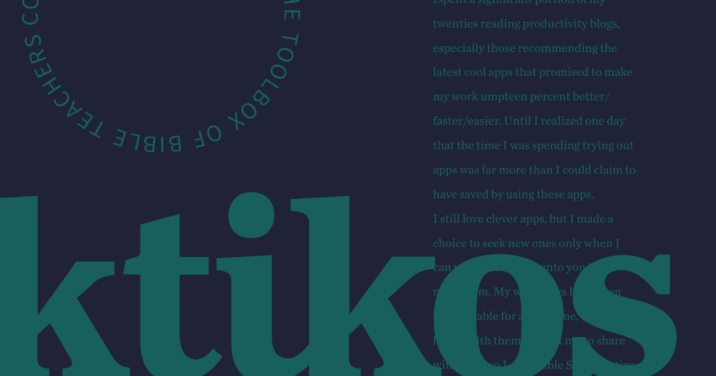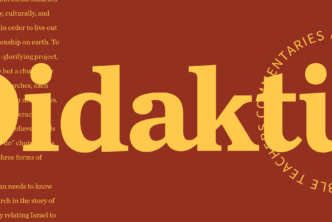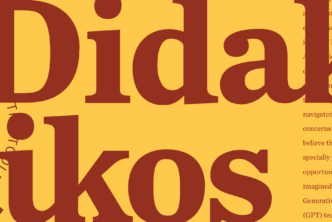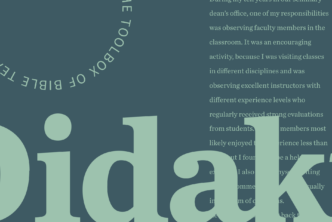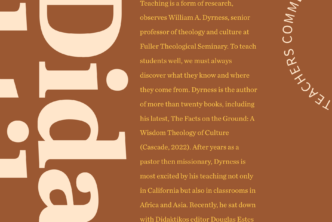by Scott McClelland | South University
Students take grades very seriously. Many times, they stick their personality out there, as well as any content, for professors to examine. In response, we place a quantitative score on a qualitative essay which comes from deep in the student’s heart. So we invented rubrics in the hope that we could justify our quantitative scoring. Rubrics, at least, provide a foundation to guide (and keep in check?) our qualitative responses to a student’s work. But are they enough?
I find it intriguing that virtually every other area of industry and profession has been touched by globalization of one sort or another. As Thomas Friedman famously told us, “The World is Flat.”1 We, then, must recognize that our tribal differences often need to take a back seat to a newly forming global culture that—at least at its heart—wishes to create more egalitarian ways of identifying value.2
In the online doctor of ministry program I teach and administer, I have a large number of African- American students. I am not a member of that community, yet it regularly falls to me to grade written work submitted from those whose ministry context is the black church. Often, I detect a sermonic cadence in the papers. These students appear to be creating what I call “sermonic couplets”—two synonyms connected by “and” (“pleased and privileged,” “hopes and dreams,” “methods and ways,” “thoughts and perceptions,” etc.). Although I appreciate a well-preached sermon as much as anyone, the standards of writing efficiency call for using just one word, not two. So I often draw attention to these couplets and tell students that, for academic papers, they need to “write to be read, not heard.” They seem to understand.
But this led me to ask: What standard am I using to grade the non-rubric areas of a student’s paper? No rubric handles all the stylistic aspects of a student’s writing, so there are gaps (at least, I imagine there are) where I am applying a common-sense standard of my own. But, as one of my own professors once told me, “Common sense is not equally common to all.” Where does mine come from?
As a WASP professor with a PhD from the United Kingdom, I imagine I have a bit of a hybrid writing style that tries to blend good old British formality with some casual American wit (you’ll need to be the judge). Where it gets most “proper,” though, is in the area of grammar, since I was constantly being corrected by my U.K. professors reviewing my dissertation. Perhaps I’m operating with that unexpressed “vow” we all take—to wreak upon future students the stress our professors applied to us! “It’s good for them,” and all that.
When I grade a paper by a student from a different cultural mix than my own, am I going beyond the rubric and applying my own criteria that will certainly trip up an uninitiated black pastor? While I think I’m protecting the hill on which Kate Turabian died, am I also subjecting this pastor to ways of writing (“to be read,” remember) that are absolutely foreign to his upbringing and will never be adopted (nor should it be) when he ministers to his own culture?
Dangling prepositions might be something “up with which we shall not put,” but does a pastor really need to translate that principle from her culture to mine in order to get a degree—just so she can go back and retranslate that degree into her cultural communication style? This is, after all, the pragmatic doctor of ministry degree I’m discussing. If I am not assessing students’ ability to minister well in their context of choice, does that not negate one of the purposes of the program?
This goes beyond a black-white issue. Many students in advanced theological programs in North America are from Spanish-speaking and Asian (often Korean) cultures. In response, some seminaries have created programs specifically for those language groups, knowing those students will likely minister within those cultural areas throughout their careers. Are there other “cultural groups” about which we should be similarly sensitive?
After correcting many subject/verb disagreements, misplaced apostrophes, and those pesky sermonic couplets, I justify that work as helping my students gain vital practice toward the capstone project they will have to write. I do this because I know I will be grading that work alongside several other professors who are just like me. I wonder, though: Am I being imperialistic about this? Am I professing a universal norm, when allowing for cultural style might better prepare students for communicating in their contexts? Am I imposing one cultural style—preferred just because it is mine—or am I educating them to be proficient in ministering in ways that honor their cultures?
This essay is supposed to offer tips for readers, but I’m afraid I have more questions than any shortcuts or helpful formulae. Perhaps it’s best to admit this dilemma and invite Didaktikos readers to share how they handle it (visit Faithlife.com/Didaktikos to join the conversation).
Should cultural sensitivity play a role in our grading? Can an awareness of my own style over against another’s be appreciated without forcing that person, through grading, to succumb to my culture? Do we need to distinguish between formal writing and, for example, online discussion posts? Should cultural communication styles be avoided in one context but accepted in the other? My program evaluates final projects in two main areas, “content” and “style”; should our “style readers” be conversant with the culture of the student? Do we truly believe there is an “academic style”—one that is able to be evaluated without partiality and necessary to maintain quality standards (which were put in place by people like me)? Can we articulate that style while also justifying it through some sort of “when in Rome” rationale? (By the way, my program in the U.K. did precisely that to me.)
At a previous post where I served as dean, we had a graduate student who never spoke up in class. I learned that “Juan” was a Spanish-speaker and was thought by his fellow students to be brilliant. However, Juan’s ability to communicate in English was poor. As his final paper in the course loomed—fifty percent of his grade—I allowed him to write it in Spanish. I found a capable bilingual professor to grade it for me. That professor said Juan’s paper showed great insight and solid research skills. Later, our president questioned me about my decision. After hearing my explanation, he said, “Great idea. But don’t do it again.”
Thanks Juan, for proving there is a dilemma. Thanks, too, Mr. President, for proving it also.

This essay was first published in the July issue of Didaktikos: Journal of Theological Education (DidaktikosJournal.com).
- Thomas Friedman, The World is Flat: A Brief History of the 21st Century (New York: Farrar, Straus and Giroux, 2005).
- Pedro Morande Court, “The Impact of ‘Globalization’ on Cultural Identities,” in Globalization: Ethical and Institutional Concerns, Acta 7 (Vatican City: Pontifical Academy of Social Sciences, 2001), 203; available at www.pass.va/content/dam/scienzesociali/pdf/acta7/acta7-morande.pdf. Court writes, “The globalization process has allowed us to understand with much greater clarity than ever before that a global observation point in which an omniscient observer can locate himself or herself and in front of which all the events of the world can be laid out in their significance cannot exist.”

